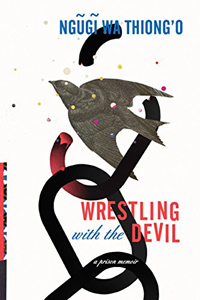 Ngũgĩ wa Thiong'o, Wrestling with the Devil: A Prison Memoir (New York: The New Press, 2018), 248pp.
Ngũgĩ wa Thiong'o, Wrestling with the Devil: A Prison Memoir (New York: The New Press, 2018), 248pp.
Around midnight on December 30, 1977, the Kenyan writer Ngũgĩ wa Thiong'o (born 1938) was arrested and then jailed in the notorious Kamiti Maximum Security Prison (a former lunatic asylum). There was no trial, or even any formal charges. His crime? The government took exception to his new play Ngaahika Ndeenda ("I Will Marry When I Want") that Thiong'o had written and performed in his home village at the Kamiriithu Community Education and Cultural Centre, using peasants and workers as actors and co-writers, and the purpose of which was to expose "the general bourgeois educational system." The play was a commercial success, but the Kenyan government shut it down after six weeks and imprisoned Thiong'o.
This newest book by Thiong'o is an edited version of his earlier memoir called Detained: A Writer’s Prison Diary (1982) that describes his year in jail. He takes his rightful place among the likes of Nelson Mandela, Martin Luther King, Alexander Solzhenitsyn, and many other authors of prison literature. It was in prison that Thiong'o made his final decision to abandon English as his primary language and to embrace his mother tongue of Gikuyu.
Although the memoir contains extended critiques of colonial Kenya under British rule (1895–1963), and "the continuity of the colonial into the postcolonial" period that followed, the particular focus of the book is the novel that Thiong'o wrote on toilet paper during his imprisonment, called Caitani Mutharabaini (1981), which was the first modern novel in Gikuyu. That novel was later translated into English as Devil on the Cross (1982). Writing the novel while in prison, he says, was his primary means of "spiritual battle" and act of defiance against the "bestial purposes" of the state: "I offer this re-edited version of my experience of survival in a maximum-security prison as a testimony to the magic of the imagination. The power of imagination to help humans break free of confinement is truly the story of all art."
After prison Thiong'o was forced into exile due to death threats and his inability to get a job under the regime of Daniel Arap Moi. After ten years at New York University (1992–2002), he became the Distinguished Professor of English and Comparative Literature at the University of California, Irvine. His prolific output of over thirty novels, plays, short stories, essays, memoirs, children's books, and allegory, with translations into 30 languages, has generated speculation about him as a candidate for the Nobel Prize in Literature.


